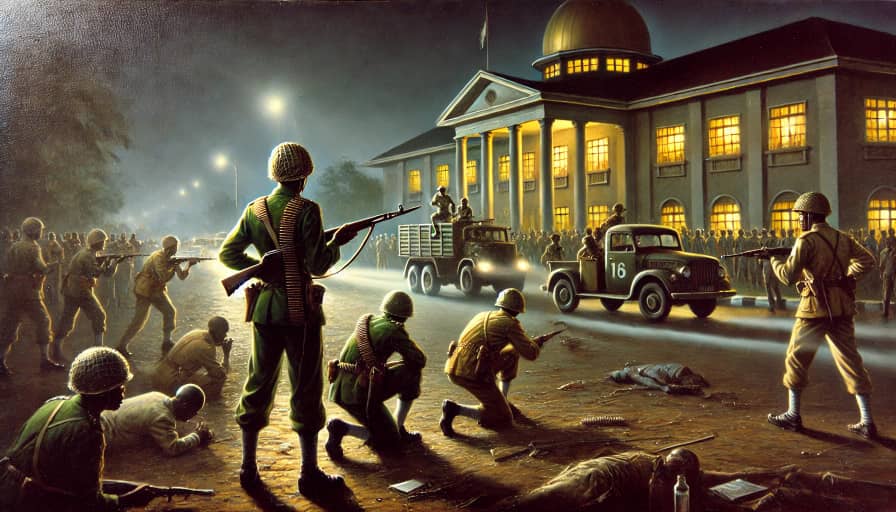Former Military Head of State, Ibrahim Badamosi Babangida, IBB, has dismissed claims that the 1966 military takeover was an “Igbo coup.”
According to Diaspora digital media (DDM) Babangida stated that the leader of the 1966 coup, Kaduna Nzeogwu, spoke Hausa fluently and identified more with the region.
In his newly launched book, ‘A Journey in Service,’ Babangida argued that Nzeogwu was only Igbo by name but culturally Hausa.
The former military ruler described the murder of Sir Ahmadu Bello and his wife, Hafsatu, as heinously callous and unjustified.
He emphasized that Ahmadu Bello was deeply revered and respected by many people across northern Nigeria at the time.
Babangida provided detailed historical insights into the events leading to the January 15, 1966 coup and its aftermath.
The coup, led by young military officers, was aimed at eliminating corruption and restructuring Nigeria’s governance system.
Major Kaduna Nzeogwu and other coup plotters executed several top political and military leaders on the night of January 15.
Among those assassinated were Prime Minister Abubakar Tafawa Balewa and key political figures from the northern and western regions.
The coup resulted in the deaths of prominent leaders like Sir Ahmadu Bello, Premier of Northern Nigeria, and Chief Samuel Akintola.
Despite the coup’s initial intention, it was perceived as an ethnic plot because no key Igbo leaders were targeted.
IBB dismisses the narrative that the coup was an Igbo conspiracy, citing the multi-ethnic composition of the coup plotters.
He argued that several non-Igbo officers, including Major Adewale Ademoyega and Captain Ganiyu Adeleke, actively participated in the coup.
According to Babangida, the coup plotters intended to release Chief Obafemi Awolowo from prison and install him as leader.
This plan, he noted, contradicted claims that the coup had an ethnic agenda since Awolowo was not particularly pro-Igbo.
Babangida pointed out that Nzeogwu grew up in Kaduna and was deeply integrated into Hausa culture and traditions.
IBB dismisses the claim that Nzeogwu was driven by Igbo nationalism, insisting he had a broader nationalistic vision.
The coup was eventually crushed by loyalist forces, leading to Major-General Aguiyi-Ironsi assuming power as Nigeria’s first military Head of State.
IBB dismisses suggestions that Ironsi’s leadership further fueled ethnic tensions following the coup.
Ironsi’s failure to punish the coup plotters and his introduction of a unitary system of government deepened suspicions.
This led to the counter-coup of July 29, 1966, which saw the assassination of General Ironsi and other Igbo officers.
The July counter-coup resulted in Yakubu Gowon emerging as the new Head of State, intensifying ethnic divisions.
IBB dismisses the view that the counter-coup was purely a northern retaliation against the Igbo.
He argued that the circumstances surrounding the counter-coup were far more complex and not solely driven by ethnic sentiments.
The aftermath of the coups set Nigeria on the path to civil war, which erupted in July 1967 and lasted until 1970.
IBB dismisses the simplistic narrative that the coups were entirely based on ethnic rivalries, emphasizing political and military factors.
Babangida acknowledged that both coups had far-reaching consequences on Nigeria’s political and military structures.
IBB dismisses the perception that the 1966 coup was designed to benefit the Igbo at the expense of other regions.
He reiterated that the coup targeted corrupt political figures rather than focusing on ethnicity as a primary motivation.
IBB dismisses allegations that the military intervention was orchestrated to promote Igbo dominance in Nigeria.
According to him, officers of different ethnic backgrounds, including Yoruba and northern officers, played active roles in the coup.
IBB dismisses claims that the coup was a deliberate attempt to eliminate northern leaders alone, given the presence of non-Igbo plotters.
The book ‘A Journey in Service’ provides an in-depth analysis of Nigeria’s historical military and political transitions.
IBB dismisses any suggestion that the military takeover of 1966 was solely an Igbo-driven agenda to control Nigeria’s leadership.
The former military ruler emphasized that historical narratives should be analyzed critically rather than interpreted through ethnic biases.
He called for unity and understanding among Nigerians, stressing that the past should serve as a lesson for future generations.
IBB dismisses the tendency to distort history for political gains, urging Nigerians to embrace factual accounts of historical events.
He insisted that national progress depends on acknowledging past mistakes and fostering reconciliation among all ethnic groups.
IBB dismisses the notion that Nigeria’s problems began solely with the 1966 coup, noting earlier political challenges.
The political tensions of the First Republic, ethnic rivalries, and economic struggles contributed to Nigeria’s instability before the coup.
IBB dismisses simplistic historical interpretations, urging scholars to approach Nigeria’s history with objectivity and accuracy.
He concluded by emphasizing that history should be used as a tool for national cohesion rather than division.
Babangida’s insights challenge many prevailing perspectives on the 1966 coup and its long-term effects on Nigeria’s stability.
Kindly share….







